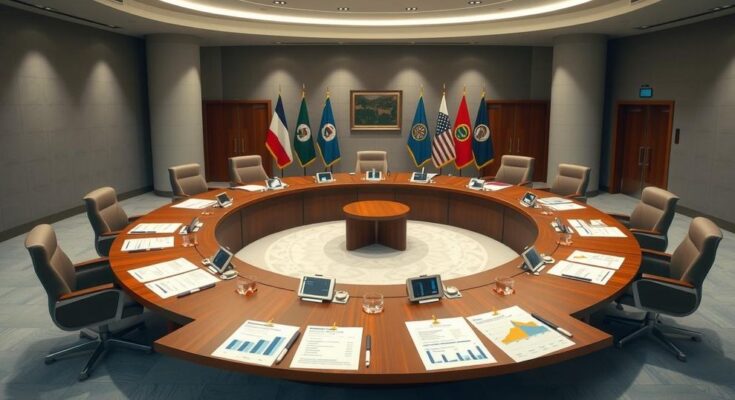The U.N. Security Council will meet to discuss Iran’s stockpile of near-weapons-grade uranium, prompted by concerns from six member nations. Diplomatic discussions will focus on Iran’s compliance with IAEA requirements and the nation’s enrichment activities, which have accelerated significantly. The situation carries implications for international sanctions, particularly as key agreements expire in the coming year.
The United Nations Security Council is scheduled to convene behind closed doors on Wednesday to address Iran’s increasing stockpile of near-weapons-grade uranium. This meeting was initiated by six council members including France, Greece, Panama, South Korea, Britain, and the United States, who also wish to discuss Iran’s obligations toward the International Atomic Energy Agency (IAEA). Specifically, they seek clarification on unaccounted nuclear materials found at various locations in Iran.
Iran has consistently denied intentions to develop nuclear weapons; however, the IAEA has raised alarms regarding Iran’s rapid uranium enrichment, which has reached levels up to 60% purity—dangerously close to the 90% purity required for weapons-grade uranium. Western nations contend that such enrichment levels are unnecessary for any civilian nuclear program, as no other nation has pursued such high levels without eventually developing nuclear armaments. Conversely, Iran maintains that its nuclear endeavors are solely for peaceful purposes.
In 2015, Iran entered into the Joint Comprehensive Plan of Action with six world powers, which imposed restrictions on its nuclear program in exchange for the lifting of sanctions. However, following the United States’ withdrawal from the agreement in 2018, Iran began to step back from its commitments under the agreement. European nations—Britain, France, and Germany—have indicated their willingness to prompt the reimposition of international sanctions if necessary to thwart Iran’s potential nuclear ambitions. They will, however, forfeit their ability to enforce such sanctions after October 18, when the related resolution from the U.N. expires. Following this, efforts from the Trump administration’s U.N. envoy may be directed toward reinstating sanctions against Iran.
The upcoming U.N. Security Council meeting reflects international concerns regarding Iran’s escalating uranium enrichment activities, approaching weapons-grade levels. Despite Iran’s assertions that its nuclear program is for peaceful purposes, Western nations express skepticism and highlight their readiness to reinstate sanctions to prevent nuclear proliferation. The expiration of existing resolutions next year adds urgency to the discussions surrounding Iran’s nuclear commitments and the geopolitical dynamics involved.
Original Source: www.usnews.com




